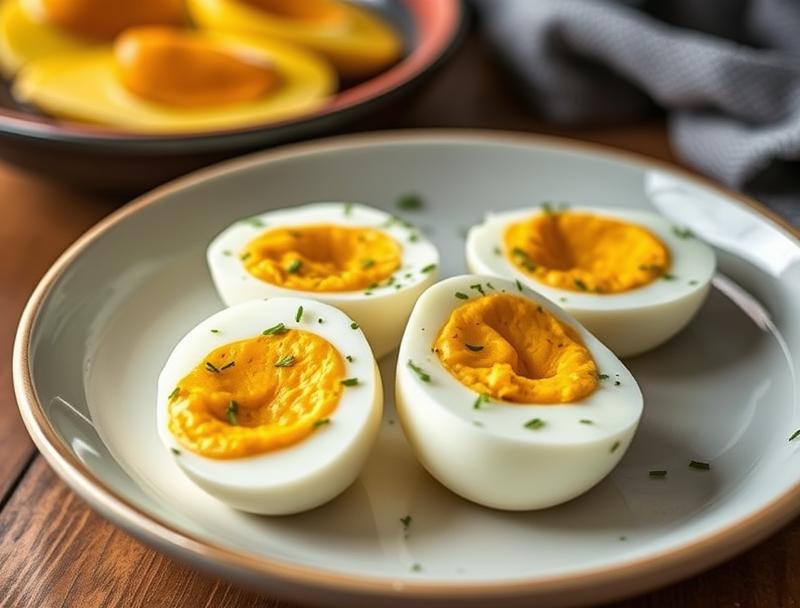Perfect Boiled Eggs
Introduction
Boiled eggs are a staple in many cuisines around the world, offering a delicious combination of ease, flavor, and versatility. Using everyday ingredients, you can create a dish that is not only a great snack but also a fantastic addition to a variety of meals, from salads to sandwiches. The beauty of boiled eggs lies in their simplicity and the endless possibilities for creativity, whether you’re looking to add a burst of protein to your breakfast, a satisfying crunch to your lunch, or a nutritious snack to keep you going throughout the day. In this article, we’ll delve into the world of perfect boiled eggs, exploring what makes them so special, how to prepare them to perfection, and the numerous ways you can enjoy them.
Why This Works
- Flavor balance and ingredient accessibility: The ingredients needed for boiled eggs are minimal and easily accessible, making it a dish that can be enjoyed by anyone, anywhere.
- Ease of preparation: Boiling eggs is one of the simplest cooking methods, requiring minimal effort and time, making it perfect for busy days or when you need a quick snack.
- Impressive results with minimal effort: Despite the simplicity of the dish, boiled eggs can be incredibly impressive, especially when paired with creative seasonings or presented in an appealing way.
Ingredients
- 4 large eggs
- Water, enough to cover the eggs
- Salt, to taste (optional, for water seasoning)
- Ice, for cooling (optional)
- Any desired additional seasonings or toppings (e.g., paprika, chili powder, chopped herbs)
Instructions
- Step 1: Begin by placing the eggs in a single layer at the bottom of a saucepan or pot. The eggs should be covered by water, so add enough cold water to the pan to cover them by about an inch.
- Step 2: If desired, add a pinch of salt to the water. This can help with the peeling process later on, although it’s optional and doesn’t affect the taste of the eggs.
- Step 3: Place the pan over high heat and bring the water to a boil. Once boiling, reduce the heat to a simmer (medium-low heat).
- Step 4: Let the eggs cook for the desired amount of time. The cooking time will depend on the size of the eggs and your preference for the yolk’s doneness. Generally, large eggs take about 10-12 minutes for large eggs to be done to a hard-boil stage.
- Step 5: After the cooking time has elapsed, immediately transfer the eggs to a bowl of ice water to stop the cooking process. This step is crucial for preventing overcooking and making the eggs easier to peel.
- Step 6: Once the eggs have cooled, crack them gently and peel off the shells. Rinse the eggs with cool water if there are any remaining bits of shell.
- Step 7: Your perfect boiled eggs are now ready to be enjoyed. You can serve them as is, sliced, or with your choice of seasonings or toppings.
Handy Tips
- For easier peeling, use older eggs, as they tend to have less moisture in the whites, making the shell come off more cleanly.
- Avoid overcooking, as this can make the yolks dry and the whites rubbery.
- Experiment with different cooking times to find your perfect boiled egg, whether you prefer a runny yolk or a completely set one.
Heat Control
Heat control is crucial when boiling eggs. Bringing the water to a boil and then reducing it to a simmer helps prevent the eggs from cracking due to sudden temperature changes. It also ensures a more even cooking process. The ideal cooking time can vary based on personal preference for the yolk’s doneness, but a general guideline is 10-12 minutes for large eggs to reach a hard-boil stage.
Crunch Factor
The texture of boiled eggs is largely determined by the cooking time. For a softer, more runny yolk, cook the eggs for less time (around 6-7 minutes for large eggs). For a firmer yolk, cook them for the full 10-12 minutes. The whites should be set and firm in both cases. Achieving the right texture is all about finding the balance that suits your taste preferences.
Pro Kitchen Tricks
- Use a steamer basket: Placing the eggs in a steamer basket above boiling water can help prevent them from cracking and make them easier to remove from the water once cooked.
- Shock in ice water: Transferring the cooked eggs immediately to ice water stops the cooking process and helps the eggs cool down rapidly, making them easier to peel.
Storage Tips
- Hard-boiled eggs can be stored in the refrigerator for up to a week. Keep them in a covered container to maintain freshness and prevent absorption of odors from other foods.
- Avoid storing hard-boiled eggs at room temperature for extended periods, as this can lead to bacterial growth and food safety issues.
Gift Packaging Ideas
Boiled eggs can be a thoughtful and healthy gift, especially when presented in an appealing way. Consider packaging them in decorative jars or containers, perhaps with some additional seasonings or garnishes like paprika, chili powder, or chopped fresh herbs. A ribbon or a gift tag with a personal message can add a nice touch, making the gift even more special and appreciated.
Flavor Variations
- Different seasonings: Experiment with various spices and herbs like smoked paprika, garlic powder, or dried dill to add unique flavors to your boiled eggs.
- Creative toppings: Add some crunch or freshness with toppings like chopped nuts, pickled ginger, or thinly sliced radishes.
- Ingredient swaps: While traditional boiled eggs are made with chicken eggs, you can also boil duck or quail eggs for a different size and flavor profile.
Troubleshooting
- Texture problems: If your eggs are too runny or too dry, adjust the cooking time accordingly. Remember, practice makes perfect, so don’t be discouraged if it takes a few tries to get your boiled eggs just right.
- Ingredient replacements: There aren’t many ingredients to replace in boiled eggs, but if you’re looking for alternatives to chicken eggs, consider duck or quail eggs for a different experience.
- Over/undercooking signs: Overcooked eggs will have a greenish tint around the yolk and a rubbery white. Undercooked eggs will have a runnier yolk than desired. Adjust your cooking time based on these signs.
FAQs
- Can I freeze boiled eggs? While it’s technically possible to freeze boiled eggs, it’s not recommended as the texture and consistency can be significantly affected. It’s best to consume them fresh or store them in the refrigerator for up to a week.
- Are boiled eggs gluten-free? Yes, boiled eggs are naturally gluten-free, making them a great option for those with gluten intolerance or sensitivity.
- Can I double the recipe? Absolutely, you can boil as many eggs as you need, just ensure they’re in a single layer at the bottom of the pan and covered by enough water.
Conclusion
Perfect boiled eggs are a culinary delight that can be enjoyed in countless ways. Whether you’re a fan of runny yolks or prefer them fully set, the simplicity and versatility of boiled eggs make them a staple in many kitchens. With these tips and tricks, you’re well on your way to creating your perfect boiled eggs, tailored to your taste preferences. Don’t be afraid to experiment with different seasonings, toppings, and cooking times to find your ideal boiled egg. Share your creations with friends and family, and enjoy the journey of culinary exploration that boiled eggs can offer.

